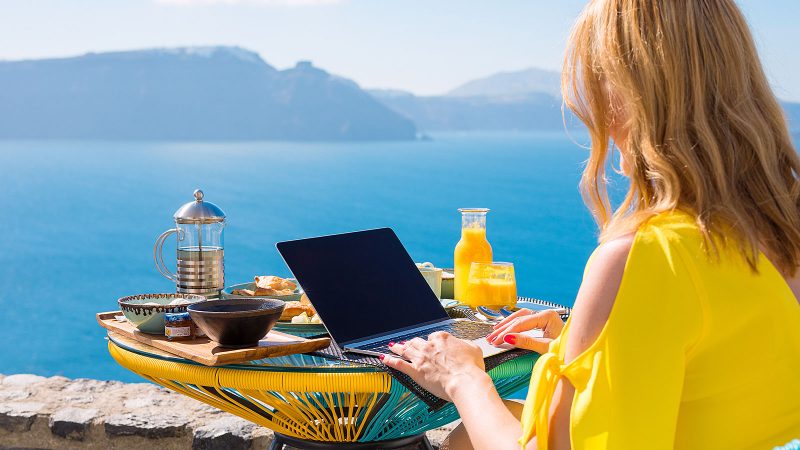Travel means new places, exotic food, vibrant fun, and first-time problems such as
getting locked out of your bank account when you try to access it from a sunny beach in
the tropics if you don’t take a few precautions before going.
Should you use a VPN while traveling?
If you’re perfectly comfortable having a random greasy stranger pressing up against
your body and watching everything you do over your shoulder, you might not care about
a VPN.
But if the thought of some lout casually examining your bank statements, criticizing your
Tinder swipes, giggling at your anxious Google searches about a friend’s embarrassing
medical issues, or making fun of your mum’s supportive messages just horrifies you, the
answer is a resounding “Yes”!
As it turns out, there are several other excellent reasons to get a VPN other than
protecting your privacy.
What does a VPN do?
A VPN (Virtual Private Network) creates a private, secure internet connection between
you and the web. It encrypts all of your internet traffic to protect, secure, and hide
everything you do while you’re online.
Without a VPN, your ISP (Internet Service Provider) or mobile data provider can see
which websites you visit and which apps you use. They can even access what emails
you send, your banking and credit card information, and your login details for sensitive
sites. It is particularly dangerous to use free public Wi-Fi, as your connection is entirely
open to people with malicious intentions.
A VPN, however, converts your data to a stream of meaningless hash, making it
useless to snoopers and hackers.
Why do you need a VPN while traveling?
One of the biggest drivers for increased VPN sales is people’s natural desire for privacy
and security. It shouldn’t be anybody’s business what you do on the internet. Someone
snooping on your activities is just plain wrong.
But it gets worse. Much as we all love freebies, all free apps and software, including
so-called “free VPNs,” sell your data to make their companies profitable. No privacy
there! On top of overloaded servers, the main problem with free VPNs is that their
cloaking technology simply can’t cut it. First-class sites such as your bank or Netflix can
easily identify and block them.
In fact, a bad VPN can be pretty dangerous while you’re in a foreign country.
Don’t run afoul of the laws of your guest country.
Some governments block access to sites they believe are detrimental to their
citizens. Their service providers log and monitor your activities, and your
activities and data would be subject to the laws of your host country.
Depending on the country, you may be completely cut off from services like
Google or platforms like Twitter, Facebook, and YouTube. In some countries, it is
even against the law to use messaging apps such as Skype, FaceTime, or
Whatsapp.
First, connect to a VPN server outside your strict host country before you use
chat apps. You should definitely not even try to use an improperly cloaked free
VPN to access these applications or services.
Prevent unsecured accidental connections
You’ll definitely come across slow or spotty internet connections while you travel.
Slow Wi-Fi won’t get any faster if you have to connect to a VPN, but you can
mitigate it by choosing an ISP with hundreds of servers worldwide and taking
care to connect to the closest one.
If your host country’s online activities may be frowned upon, your safety may
depend on a technically advanced kill switch for your connections. This is
essential if you use instant messaging or chat apps on your mobile phone
because an accidental unsecured connection could plunge you into a situation of
closer scrutiny.
Retain access to sensitive accounts.
If you suddenly try to log in to your bank or credit card accounts from
Madagascar or Malaysia when you’ve lived in Merrimack, MA., all your life, your
account will be blocked instantly.
It could take several days, expensive phone calls, or other extreme measures to
regain access while you wait for money huddled under palm trees on the beach.
NordVPN is one of a short list of VPNs whose cloaking technology is powerful
enough to convince advanced websites of the validity of your IP address location.
If you set your location to a US server, there won’t be any red flags. Your bank
will unconditionally accept that your location is, in fact, in the US.
Get a taste of home when all the excitement causes emotional overload.
New and exotic is great, but sometimes you just need a quick dip into a familiar
experience to help you appreciate the wonders of your host country all the more.
Netflix and Amazon Prime are available worldwide, but if you log in to your
account from a local ISP, you will be confronted with the local catalog of your
host country. That’s probably not what you will be looking for! Additionally,
services like Hulu, Starz Play, PBS, or BBC also use highly advanced technology
that will cut through the inferior cloaking of a free VPN like a hot knife through
butter.
Get fantastic travel deals.
Most travel-related websites offer prices based on your IP location or offer
package deals only available to shoppers with foreign IP locations. It’s worth
setting your connection to a few different countries to compare prices and see if
you can get a better deal before you buy.







